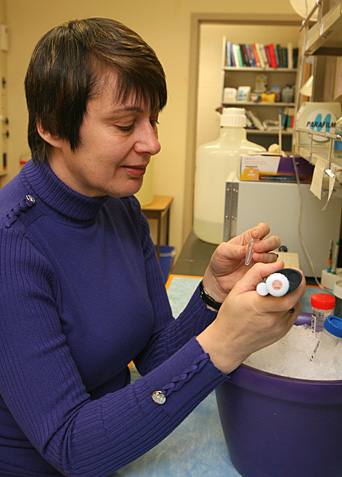
Dr. Maria Diakonova prepared DNA probes from human breast cancer cells. The probes are used for polymerase chain reaction to test the expression of proteins that regulate cell motility and invasiveness.
The University of Toledo’s Department of Biological Sciences is receiving attention and funding from the National Institutes of Health (NIH) for its breast cancer research.
Dr. Maria Diakonova, assistant professor of biological sciences, received the NIH Research Project Grant, which is more than $1.5 million during the next five years, for her work focused on determining why cancer cells move and what causes them to do so. She is basing her research on the hormone Prolactin, which causes cells to migrate and invade.
“Cancer cells move throughout the body, which is why surgery doesn’t always work,” Diakonova said. “If we can inhibit the cells from moving, we can also inhibit them from spreading, thus eventually making it possible to remove cancer cells by surgery alone.”
Dr. Douglas Leaman, professor and chair of the Department of Biological Sciences, believes that Diakonova’s work was noticed and the grant was awarded because of the originality of the research.
“There are a lot of people doing breast cancer studies; however, very few people study the effect that Prolactin has on the crosstalk between these particular molecules, JAK2 and PAK1, which is what Dr. Diakonova is doing,” he said.
“Hormone Prolactin binds to the receptors on the cell surface and activates an intracellular protein called JAK2,” Diakonova explained. “We have recently shown that another protein, PAK1, is a novel substrate of JAK2. We showed that JAK2 binds to PAK1 and makes PAK1 more active. Activated PAK1 contributes to better cell migration and invasion. However, how these two proteins work together and the precise mechanism of their action is unknown.”
Diakonova’s lab currently consists of four graduate students and two undergraduate students; she also has connections with UT Medical Center. She hopes to some day work with surgeons to evaluate samples from patients in different stages of breast cancer.
“It’s beneficial to have access to cancer patients,” Leaman said. “We try to as quickly as possible take what we discover over to UTMC to see if it is relevant to their patients.”
While Diakonova’s findings might not turn into a cure for breast cancer, Leaman said, “Her studies may identify specific biomarkers that could make it easier to detect cancer cells with metastatic potential at an earlier stage or help doctors know that they need to look at these particular molecules during clinical evaluations.”
In addition to Diakonova’s grant, the Department of Biological Sciences has received numerous prestigious awards for its research in neurology, immunology, plant and developmental biology, Leaman said.
“I feel these awards are reflective of the many recent successes our department has had in answering important biological and medical questions,” he said.